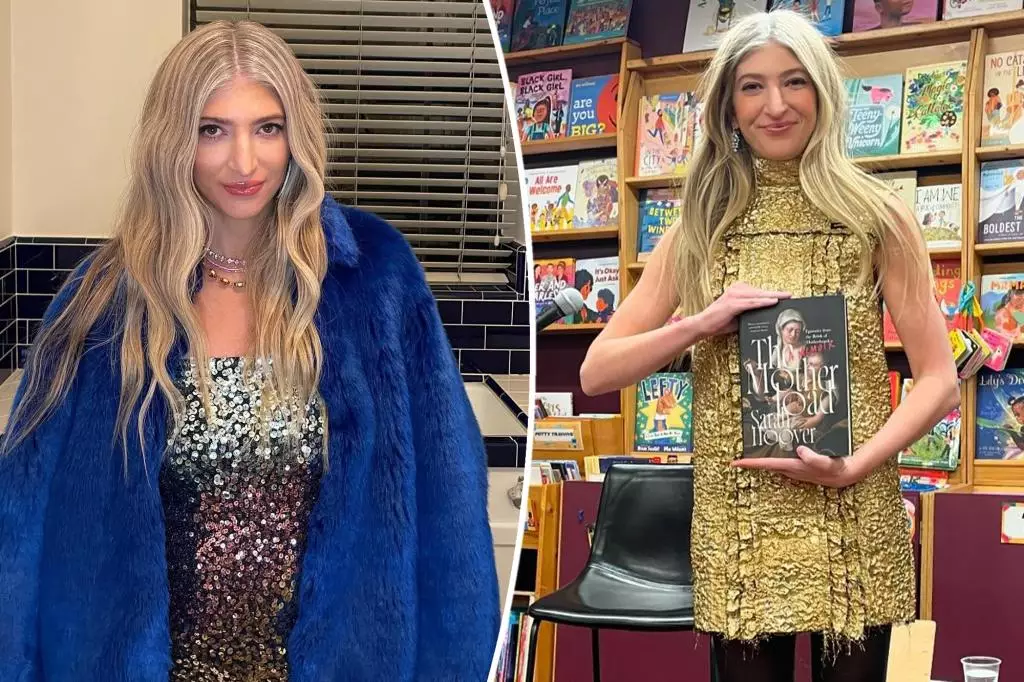In the ever-evolving landscape of memoir writing, the line between personal narrative and public discourse often blurs, occasionally leading to heart-wrenching consequences, as illustrated by the controversy surrounding socialite Sarah Hoover’s recent book, “The Motherload.” The central grievance comes from Hoover’s estranged sister, who alleges that her private pain—specifically, the stillbirth of her child—has been callously exploited in a memoir that garnered both critical acclaim and widespread attention. By sharing an account of this sensitive subject without consent, Hoover’s actions not only jeopardize her familial relationships but raise broader questions about ethical boundaries in memoir writing.
The estrangement goes beyond mere disagreement; it digs deep into what accountability means in the realm of storytelling. The sister’s accusations are alarming: she has not only called for Hoover to be held accountable but has also accused her of fabricating elements of the story. One cannot help but wonder where the line is drawn between artistic license and ethical responsibility, especially when the subject’s emotional health hangs in the balance.
Public vs. Private Narratives
Hoover’s publicist has scantily addressed the allegations, referring to the situation as a “family matter” and emphasizing that Hoover writes from her lived experiences. However, this reasoning fails to address the fundamental issue at hand: what happens when personal narratives infringe upon the experiences of others? By sharing deeply personal moments that the sister specifically requested remain confidential, Hoover risks being seen not just as a memoirist but as a figure who prioritizes professional acclaim over familial loyalty.
The ramifications of this betrayal are profound. The sister describes her emotional breakdown upon discovering her private grief laid bare for a public eager to consume stories of pain and heartache. It’s worth questioning how far the memoirist’s right to share their story extends when it involves the lived experiences of others. Does sheer talent or societal acclaim give an author a free pass to trample on the dignity of those close to them?
The Weight of Memory and the Creative License
But this isn’t merely an argument about rights; it dives into how memory functions in creative narratives. Sarah Hoover’s references to holding her deceased nephew—claims which the sister vehemently disputes—serve to amplify the theme of postpartum depression and the struggle of motherhood within “The Motherload.” However, when artistic embellishments contradict the lived reality of family members, the veracity of the narrative disintegrates. Herein lies the paradox: while personal memoirs are, by nature, subjective, they must also tread cautiously in territories that could wound those intertwined with the storyteller’s life.
This situation doesn’t just affect Hoover’s familial ties; it also tarnishes her reputation as a memoirist. Readers love authenticity and real connections in storytelling, yet that authenticity hinges on the trust established between the author and those represented in their works. The fallout from this scandal puts Hoover’s literary integrity into question—how can readers trust her accounts when relationships are shattered over them?
A Broader Discussion on Artistic Responsibility
This controversy reverberates beyond Hoover’s narrative and exposes a troubling trend in memoir writing that prioritizes sensationalism over sensitivity and connection. The public has an insatiable appetite for the personal lives of its celebrities, and this has created a culture of storytelling that often sacrifices family histories for a shot at fame. Writers must grapple not only with their narrative voice but also with the echoes of their words.
In a society increasingly concerned with mental health and the repercussions of trauma, should the privilege of memoir writing extend to those whose lives intersect yet are not permitted a tellable narrative? As the internet amplifies familial disputes and public outcry through platforms like Reddit, significant questions surface about personal accountability in creative arts.
In navigating these complexities, one must ponder: does artistic expression justify emotional harm? As the public places Sarah Hoover under the microscope, it is crucial to foster conversations around the delicate balance between sharing personal anguish and respecting the sanctity of shared grief within the family unit.

Leave a Reply